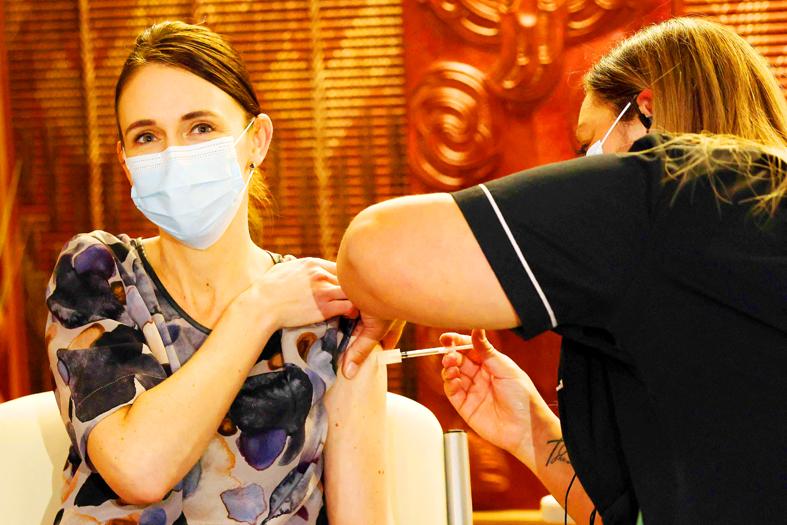US President Joe Biden, Russian President Vladimir Putin and Chinese President Xi Jinping (習近平) were yesterday among the world leaders who met virtually for an APEC summit in Wellington, seeking collective actions to navigate the COVID-19 pandemic and its economic fallout.
New Zealand, the revolving APEC host, said this week that it would chair the extraordinary meeting ahead of a formal gathering in November, the first time such an additional meeting has been held.
The meeting was to highlight growing concerns over COVID-19 outbreaks in the Indo-Pacific region, including in Australia, Indonesia and Thailand.

Photo AFP
New Zealand Prime Minister Jacinda Ardern stressed the importance of the 21-member group working together to navigate a way out of the pandemic in a call with Biden ahead of the meeting.
However, tensions among APEC members — mostly notably between the West and China over the origins of COVID-19, trade, Xinjiang and the South China Sea — could yet upend the agenda. A senior Biden administration official said that the US president would use the forum to demonstrate his commitment to a free and open Indo-Pacific region.
“As one of the first opportunities he has to engage with many of these leaders, he will make clear that the US has an enduring commitment to the region. He will put forward a vision for the region that is based on our values,” the official said.
Biden would also discuss how the region can work together to fuel the global economic recovery.
The meeting was to include an “interactive” question-and-answer session where leaders can ask questions or make comments, a format that is unusual for APEC summits, where events are usually scripted.
“We expect a dynamic and interactive discussion among leaders. That is the intention of such a meeting,” a regional diplomat said. “We hope through this leaders’ meeting there will be a more concrete program for mitigating the pandemic.”
APEC includes the world’s three largest economies and impoverished nations such as Papua New Guinea, as well as members at vastly different points in the COVID-19 cycle, providing further challenges for building consensus.
APEC’s consensus model has been tested in the past few years, with the group unable to agree on a communique at a 2018 meeting in Papua New Guinea, driven by differences between the US and China.
The 2019 APEC meeting in Chile was cancelled due to protests, while the one in Malaysia last year saw officials hastily organizing a virtual meeting as the pandemic locked down the world.
Last month, APEC trade ministers agreed to review trade barriers, and expedite the cross-border transit of COVID-19 vaccines, but stopped short of a broad commitment to remove tariffs, which New Zealand was pushing for.
APEC members have recorded more than 50 million virus cases and more than 1 million deaths.

SECURITY: As China is ‘reshaping’ Hong Kong’s population, Taiwan must raise the eligibility threshold for applications from Hong Kongers, Chiu Chui-cheng said When Hong Kong and Macau citizens apply for residency in Taiwan, it would be under a new category that includes a “national security observation period,” Mainland Affairs Council (MAC) Minister Chiu Chui-cheng (邱垂正) said yesterday. President William Lai (賴清德) on March 13 announced 17 strategies to counter China’s aggression toward Taiwan, including incorporating national security considerations into the review process for residency applications from Hong Kong and Macau citizens. The situation in Hong Kong is constantly changing, Chiu said to media yesterday on the sidelines of the Taipei Technology Run hosted by the Taipei Neihu Technology Park Development Association. With

A US Marine Corps regiment equipped with Naval Strike Missiles (NSM) is set to participate in the upcoming Balikatan 25 exercise in the Luzon Strait, marking the system’s first-ever deployment in the Philippines. US and Philippine officials have separately confirmed that the Navy Marine Expeditionary Ship Interdiction System (NMESIS) — the mobile launch platform for the Naval Strike Missile — would take part in the joint exercise. The missiles are being deployed to “a strategic first island chain chokepoint” in the waters between Taiwan proper and the Philippines, US-based Naval News reported. “The Luzon Strait and Bashi Channel represent a critical access

CARROT AND STICK: While unrelenting in its military threats, China attracted nearly 40,000 Taiwanese to over 400 business events last year Nearly 40,000 Taiwanese last year joined industry events in China, such as conferences and trade fairs, supported by the Chinese government, a study showed yesterday, as Beijing ramps up a charm offensive toward Taipei alongside military pressure. China has long taken a carrot-and-stick approach to Taiwan, threatening it with the prospect of military action while reaching out to those it believes are amenable to Beijing’s point of view. Taiwanese security officials are wary of what they see as Beijing’s influence campaigns to sway public opinion after Taipei and Beijing gradually resumed travel links halted by the COVID-19 pandemic, but the scale of

Pope Francis is be laid to rest on Saturday after lying in state for three days in St Peter’s Basilica, where the faithful are expected to flock to pay their respects to history’s first Latin American pontiff. The cardinals met yesterday in the Vatican’s synod hall to chart the next steps before a conclave begins to choose Francis’ successor, as condolences poured in from around the world. According to current norms, the conclave must begin between May 5 and 10. The cardinals set the funeral for Saturday at 10am in St Peter’s Square, to be celebrated by the dean of the College